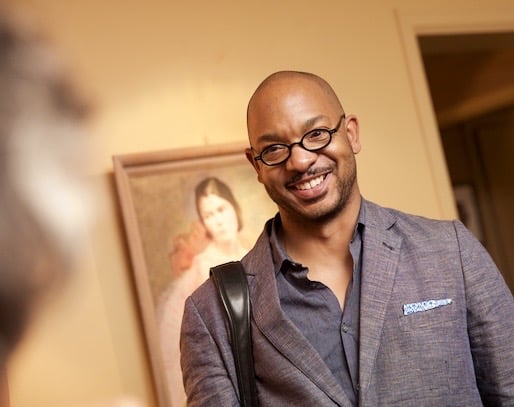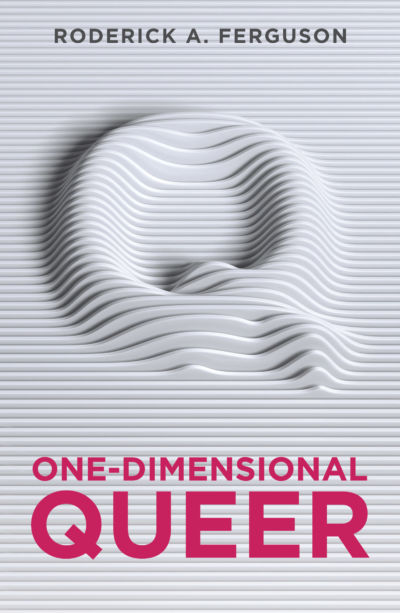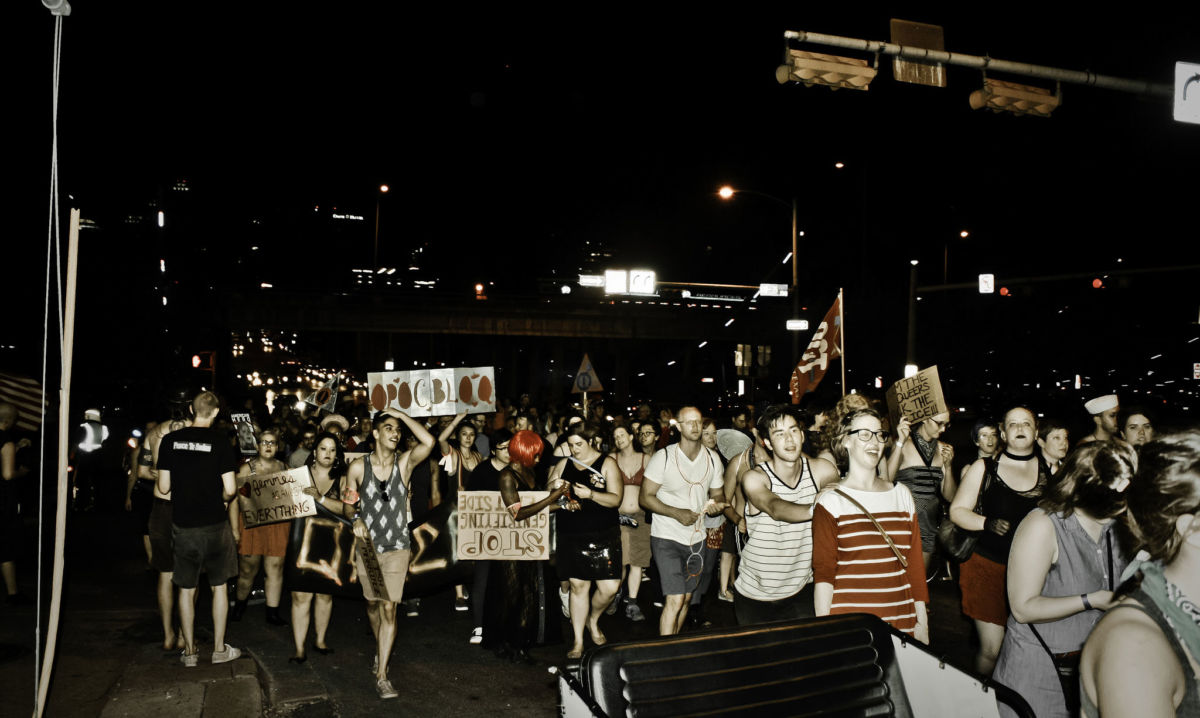Part of the Series
Progressive Picks
Author and professor at the University of Illinois at Chicago, Roderick A. Ferguson, takes a deep dive into the radical roots of the LGBTQ movement in his new book One-Dimensional Queer. In this interview, Ferguson discusses the capitalist motivations for commodifying queerness and how the movement today can combat those motivations to return to a more intersectional movement.
Samantha Borek: This book struck me as very poignant, especially in the current political moment as well as the state of LGBTQ movements today. Was there any one moment that made you feel this book needed to be written?
Roderick A. Ferguson: I, and many others, have been struck by the accumulation of various moments that require a critique of how gay or queer liberation has been narrowed in the name of gay rights, gay belonging, gay consumption. People forget that, for instance, the freedom to marry, the right to participation in the military, and the expansion of hate crime legislation — which has contributed to the expansion of the prison-industrial complex — were part of the primary agenda for gay rights organizations in the 1990s, as Dean Spade and Craig Wilse analyzed almost 20 years ago. That cluster of agendas that made gay entrance into the mainstream part of the expansion of the US’s military and penal powers was the first time that I thought that there needed to be a critique of how gay and queer politics had strayed. I also remember the first time I saw the rainbow flag advertised as a barcode. That was back in the 2000s. It suggested immediately that LGBTQ identity was being tied to the expansion of capitalism. I bring all of this up to say that the mainstreaming of LGBTQ politics is really about the accumulation of various “moments,” an accumulation that bolsters the powers of the state and of the market.
In the book, you note the University of Toronto’s homophile group quoting Milton Friedman, an economist that would later advise Margaret Thatcher and Ronald Reagan: “There is an economic incentive in a free market to separate economic efficiency from other characteristics of the individual.” Could you elaborate on that? Why is that purposeful disconnect important to recognize in queer movements today?

Well, the group was interpreting Friedman in order to align gay rights with neoconservative ideologies concerning market capitalism. It’s the idea that the market is rational and unprejudiced, that the market only values whether or not you’re an efficient and productive worker, that everyone has equality of opportunity in a market that doesn’t discriminate on the basis of your racial, class, gender or sexual identity. Now, the history of labor discrimination and labor segmentation — because of the gender and race of the applicant, as well as the history of redlining — are just two realities that shatter this notion that the market is blindfolded like the image of Justice. Invoking Friedman was a way for groups like the U of T homophile group to claim that the market would be the great rescuer of LGBT folks and usher them into the social mainstream.
There’s an interesting quote (which the book aims to refute) from Leo Louis Martello, “GAY POWER … means earning and paying one’s way,” suggesting that monetary gain means liberation. This reminds me a lot of Caitlyn Jenner, a wealthy, white trans woman who put her stock in Donald Trump, which other white LGBTQ folks did in turn. This seems to be a notion rooted in capitalist white supremacy. How does this contrast with the intersectional, radical picture of queer movements from the ’60s and ’70s?

If you think about groups like Street Transvestite Action Revolutionaries (STAR), started by Sylvia Rivera and Marsha P. Johnson; the group Third World Revolution; or the Philadelphia group DYKETACTICS, there was no belief that the wealthy would come in and make lives of poor people, people of color, or the great majority of gay or trans people better. How could people believe that in a moment in which they were actively paying attention to all the ways in which wealth was decreasing the life-chances of the poor, who were differentiated not only by race and class, but by gender and sexuality as well? The moment in which these groups were active was one in which they were all in a sense saying that their various differences were not there to be the handmaids of state, capital and white supremacy. We can differentiate them from Caitlyn Jenner and her bourgeois counterparts in that way for starters.
In my own historical understanding, I (and other youths) would assume that the depoliticizing of queer movements only occurred in the last few years. The second chapter of your book suggests that “gay respectability” came into play almost immediately after Stonewall with most of the “blame” for the violence being laid on groups like the Black Panthers and Yippies (Youth National Party). How is this continuing to play out today, particularly in how we celebrate Pride Month?
Yes, I was interested in the earlier emergence of gay respectability as well. It was one of the surprises, how soon after Stonewall it emerged and how it arose as a challenge to the lively anti-racist, anti-imperialist and socialist politics being developed by queer groups. To the extent that Pride becomes a way of externalizing anti-racist and anti-capitalist politics to “those other groups” is the extent to which Pride walks in this bourgeois legacy.
In Austin, Texas, we have QueerBomb in addition to typical Pride. How do celebrations like that, which aim to combat corporate control and commodification of Pride, fit into the radical narrative of queer history?
Events like QueerBomb are hugely important because of the ways in which they try to take inspiration from the radical queer past and for the ways in which they try to shed light on the organizations that are trying to extend the legacies of that past. These events are also important because they demonstrate the creative ways in which people are trying to express the diversities of queerness for critical and alternative purposes. Part of what was so interesting to me doing the research and the writing for the book was how political, economic and social forces were trying to convince queers to press their interests and energies into the confines of what the government and the market would allow. This was a way of trying to quash queer experiments with socialist and anti-racist politics and alternative family formations. The more events (like QueerBomb) that try to reactivate those experiments, the better off we’ll all be.
What, in your view, is imperative for the growing community to do or recognize, in order to continue in the radical tradition of Stonewall, Sylvia Rivera, Marsha P. Johnson, etc.?
We have to encourage and develop practices whereby queerness isn’t a surrender to the status quos of race, class, gender and sexuality. It means building forms of queerness that reject the given realities of the government and the market. After having written the book, I now take the real meaning of Stonewall as not about the singular assertion of gay and sexual liberation at all. It was, in fact, a refusal to accept a whole series of domination. Through the book, I learned that Stonewall was connected to so many issues — institutionalized homophobia and transphobia on a campus like NYU, demonstrations against the violent uses of police power, critiques of US imperialism in places like Puerto Rico, efforts to produce housing security for the most vulnerable. Continuing the radical tradition of the founders of STAR has to be grounded in a multi-dimensional politics and activism. That is my new understanding of Stonewall after the book.
